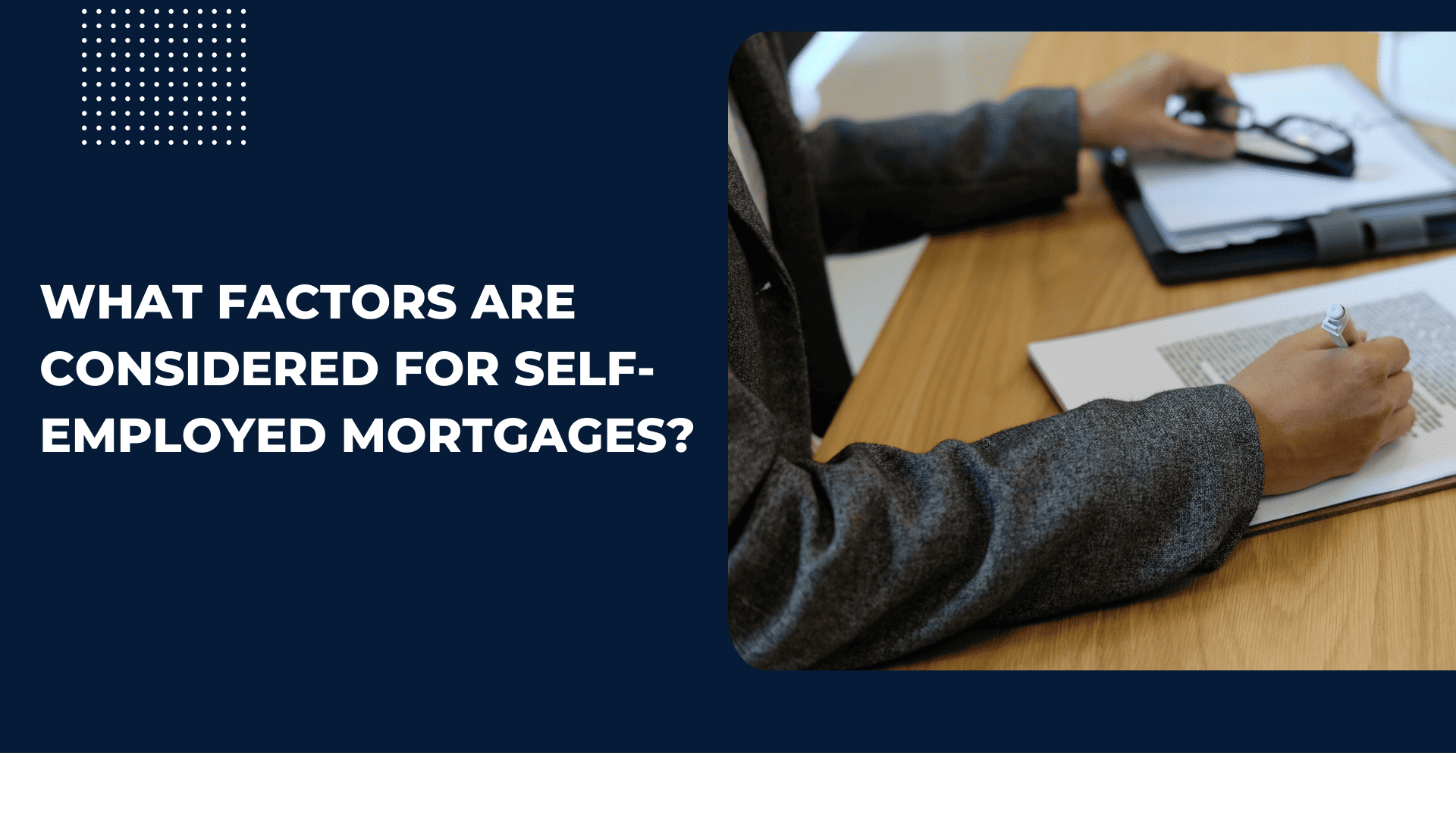Table of Contents
Welcome to our guide for freelancers and contractors seeking a mortgage. Here, we unravel the complexities of mortgage applications and mortgages for freelancers and self-employed individuals, offering key insights and practical advice to help you confidently navigate this process.

How Is Self-Employed Income Calculated For A Mortgage?
When assessing a mortgage application for a self-employed person, lenders typically review the average income over the past two or three years. This approach allows them to gauge the stability and sustainability of your income. This total income calculation for limited company directors often includes salary and dividends.
In contrast, for sole traders, lenders primarily focus on the net profits. It’s vital to demonstrate a steady or above-average profit and increasing income trend, as most lenders are cautious about fluctuating incomes when considering self-employed mortgage applications.
Mortgage Lenders For Self-Employed
The mortgage market for self-employed individuals is diverse, with each lender applying its own criteria and risk assessments. Self-employed mortgage applicants, including sole traders and company directors, often face stringent scrutiny regarding their income, especially net profit and retained profits. Lenders aim to evaluate the sustainability and reliability of an applicant’s earnings.
Navigating this complex landscape requires a nuanced understanding of various lenders’ policies. A knowledgeable mortgage broker can be a crucial ally in this process. They possess in-depth knowledge of the lending market and can identify mortgage lenders more inclined to accept self-employed applicants. Brokers can also offer advice on presenting your financial situation, potentially increasing your chances of obtaining a favourable mortgage offer.
Learn more on: The Self-Employed Mortgage Guide: What You Need to Know

Can I Get A Mortgage As A Freelancer?
Yes, as a freelancer, you are certainly eligible to apply for a mortgage. However, the process might be slightly different compared to traditionally employed applicants.
A mortgage lender may often require more extensive documentation to assess the stability and reliability of your income. It’s crucial to prepare thoroughly for your mortgage application to increase your chances of approval. Lenders will typically focus on your net income to determine your borrowing capacity. They assess this by evaluating your income over the past two or three years to ensure a stable income trajectory.
Am I Classified As A Freelancer?
In the eyes of mortgage lenders, if you are independently working on various projects or contracts and not permanently employed by a single company, you are classified as a freelancer.
This classification means that most lenders will assess your mortgage application under their self-employed criteria, which typically involves a more detailed examination of your income and financial stability. Lenders view this as self-employed income and will scrutinise your financial records closely.
Applying For A Mortgage As A Freelancer
When applying for a mortgage as a freelancer, it’s important to demonstrate financial stability and reliability. A specialist freelance mortgage broker can be invaluable in this process. They understand the nuances of freelancer applications and can guide you in presenting your case effectively to lenders. They can also help you navigate various mortgage deals, ensuring you find one that suits your needs.
Working with a specialist lender familiar with freelance income can greatly improve your chances of obtaining a favourable mortgage. They are often more equipped to understand the fluctuating nature of freelance income and can offer flexible terms that align with your financial situation. Additionally, using a self-employed mortgage calculator can give you a preliminary idea of your mortgage repayments, helping you plan your finances accordingly. This tool takes into account your self-employed income and provides an estimate of what you might expect to pay monthly, which is crucial for budgeting and financial planning as a freelancer.
How Will My Income Be Assessed?
Most lenders will assess your income based on an average of your earnings over the last two to three years. They will review your tax returns, bank statements, and any other relevant financial documentation to determine this average annual income amount. This approach helps lenders understand the sustainability of your earnings and calculate how much they are willing to lend.
Your credit history also plays a significant role in your mortgage application. Lenders will review your credit score and history to gauge your reliability in managing finances. A strong credit history can significantly enhance your mortgage prospects.
To summarise, while obtaining a mortgage as a freelancer can be more complex compared to employed applicants, it is entirely feasible with the right preparation and support. Working with a specialist mortgage broker can help streamline the process, ensuring that your unique circumstances as a self-employed individual are correctly presented and understood by potential lenders.

Additional Considerations
Let’s dive into some additional elements you must consider when applying for a freelancer mortgage.
Preparing Financial Documentation
For freelancers, preparing and organising financial documentation is a crucial step in the mortgage application process.
This includes compiling at least two to three years of tax returns, which showcase your income history. Additionally, bank statements are essential as they provide a real-time snapshot of your financial situation. Keeping detailed records of your income and expenses, preferably certified by an accountant, can also strengthen your application. Accurate financial documentation helps demonstrate a clear and reliable income pattern, which is key for mortgage lenders.
Understanding Lender Criteria
Different mortgage lenders tend to have varying criteria when it comes to assessing freelancer mortgages. While most lenders focus on average income, some may have specific requirements or offer more flexibility for freelancers with less predictable income streams. Understanding these criteria is key to finding a suitable mortgage deal. A specialist mortgage broker can provide invaluable assistance in this area, helping you navigate the diverse lender policies and find the most favourable terms for your situation.
Maximising Your Mortgage Options
Exploring various mortgage options is vital for freelancers to secure the best possible deal. This includes researching different types of mortgages (such as fixed-rate, tracker, or offset mortgages) and comparing interest rates and terms from various lenders. Considering the full spectrum of mortgage products can reveal options that might be more suited to the unique financial dynamics of freelancing.
Credit Score and Financial Health
Maintaining a good credit history and a strong credit score is essential for freelancers applying for a mortgage. Your credit history gives lenders an insight into your financial reliability. Regularly check your credit report for errors and work on improving your score if needed, such as by paying off debts and avoiding late payments. A higher credit score can enhance your eligibility for better mortgage deals and interest rates.
Deposit Considerations
The size of your deposit can significantly influence your mortgage application. Generally, a larger deposit reduces the lender’s risk, which could result in more favourable mortgage terms and interest rates. A substantial deposit can be particularly advantageous for freelancers, who might face stricter lending criteria due to variable incomes. It improves the chances of mortgage approval and can expand the range of available mortgage options.

Mortgage Lenders And Professional Advice
Navigating the mortgage landscape as a freelancer can often seem complex and overwhelming. Our aim is to simplify this process, providing clear and straightforward mortgage advice tailored to the unique needs of freelancers. With a focus on offering industry-leading advice and clear recommendations from best mortgage lenders, we assist freelancers in exploring their mortgage options and the entire mortgage application process.
We understand that every freelancer’s journey is different – whether you’re purchasing your first home, looking to secure a re-mortgage, raising funds for home improvements, or consolidating debts. Our commitment is to help you move forward into the next chapter of your life, equipped with the best possible mortgage solutions. Working with a range of lenders, including High Street banks and specialist mortgage providers, we ensure that our freelance clients receive the guidance they need to secure the homes they truly deserve.
Receive The Mortgage Deals You Deserve
As a specialist company director mortgage broker, Mark sees things differently, allowing him find the best mortgage for you.
Mark Jones has over ten years of experience in helping company directors’ customers find the mortgages they need. Even if you’ve struggled to find a mortgage through other channels, Mark may be able to help.
Conclusions
In summary, while securing a mortgage as a freelancer or contractor may come with its unique set of challenges, it is certainly achievable with the right approach and preparation. Understanding the requirements of mortgage lenders, presenting a strong financial profile, and having a clear record of your income are crucial steps in this journey. It’s important to remember that specialist lenders and mortgage brokers can be valuable allies, offering tailored advice and access to mortgage deals that suit the fluctuating income patterns of self-employed individuals.
By being well-prepared and informed, you can increase your chances of successfully obtaining a mortgage, paving the way to owning your home. Remember, each freelance journey is unique, and with persistence and careful planning, securing a mortgage can be a realistic and attainable goal.

Frequently Asked Questions
See below, where we have answered some of your frequently asked questions about the freelancer mortgage.
Can You Get A Mortgage If You're Freelance?
Absolutely, freelancers can obtain a mortgage. Specialist lenders and mortgage brokers are increasingly catering to the needs of self-employed people, including freelancers.
While the process may differ from that for traditionally employed individuals, many mortgage lenders recognise the growing freelance economy and offer tailored self-employed mortgages. As a freelancer, you’ll need to demonstrate your financial stability and income, often through detailed financial records and potentially with the help of a qualified accountant.
How Long Do You Have To Be a Freelancer Before Getting a Mortgage?
Most mortgage lenders require a minimum period of consistent freelance work, typically at least two years, before considering a mortgage application.
This period allows them to assess the sustainability and stability of your freelance income. However, some specialist lenders may consider applicants with a shorter freelancing history, especially if they can demonstrate strong earning potential and financial stability.
How Does A Self-Employed Person Get A Mortgage?
For a self-employed person, including freelancers, to get a mortgage, the key is to provide comprehensive proof of income.
This usually involves submitting tax returns, bank statements, and sometimes, a detailed account of ongoing contracts. Having your financial records prepared or verified by a qualified accountant can enhance the credibility of your application. Specialist lenders are often more adept at assessing self-employed applications, considering factors like fluctuating income and unique business expenses.
Does Being A Contractor Affect Getting A Mortgage?
Being a contractor can affect your mortgage application, but it doesn’t preclude you from getting one. Like other self-employed people, contractors must prove their income stability to mortgage lenders. This can be through evidence of ongoing contracts, historical income, and possibly projected earnings. Some lenders are more familiar with contracting and can offer freelance mortgages tailored to these circumstances. They assess your financial situation based on the nature and continuity of your contracts, considering your overall financial health and credit history.
Are Self-Employed Mortgages Hard To Get?
Gaining mortgage approval as a self-employed worker can be more challenging compared to a traditionally employed individual. The main hurdle lies in proving the stability and predictability of income to mortgage providers.
However, it is feasible with the right approach. Self-employed applicants must meticulously document their income and maintain a good credit score. Additionally, the larger your deposit, the more favourably mortgage providers tend to view your application. This is because a substantial deposit reduces the lender’s risk. Seeking mortgage advice from a qualified mortgage adviser or mortgage advisor can also streamline the application process, ensuring you meet the specific requirements of relevant lenders.
What Are The New Mortgage Rules For Self-Employed?
Recent updates to mortgage rules for self-employed individuals primarily focus on providing more rigorous evidence of income stability and sustainability. Lenders may now require more detailed financial records, including at least two to three years of certified accounts, tax returns, and up-to-date bank statements.
These documents help in assessing the average income more accurately. Additionally, some lenders have adjusted their criteria to accommodate the changing landscape of self-employment, such as considering retained profits for company directors or assessing freelancers with less than two years of trading history. It’s essential to stay informed about these evolving criteria, as they vary significantly among mortgage lenders. Consulting with a specialist mortgage broker can provide up-to-date information and guidance tailored to the current market rules and individual financial situations.






